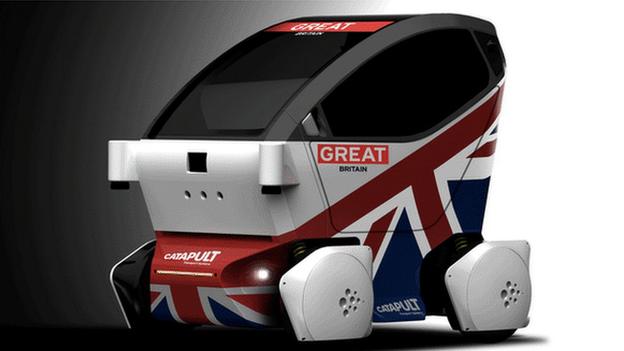Google's driverless car is brilliant but so boring
- Published
- comments
Google shows off its driverless pod car
The biggest compliment you could possibly give the Google driverless car team is that experiencing their groundbreaking product feels utterly unremarkable. Dull, even.
Let me explain.
This week I, along with a heap of other reporters, was given a ride in two of their driverless vehicles.
The first was a modified Lexus that has been out on the streets around here for well over a year now, and is improving and learning every day as new scenarios are logged and analysed by the team.
This version, which is the most "ready" for the roads, though still years off, is essentially a normal car. Except it drives itself.
The second "car" (at what point does something stop being a car?) was more interesting, and is a better reflection of where Google is ultimately going with all this.
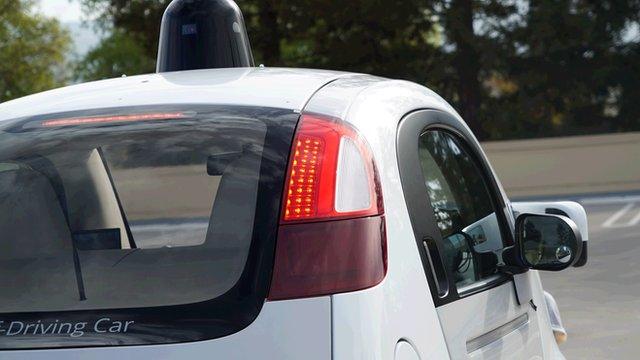
The prototype car doesn't have a steering wheel and barely any controls at all
Safe and cautious
It's an odd little pod, a prototype for a fully autonomous vehicle. No steering wheel. No pedals. Nothing really - save for a couple of chairs with a control panel in between.
The prototype was unveiled earlier this year, but we didn't hear much about it. Now, Google had set up an obstacle course on top of one of its buildings. Across the makeshift course were "hazards" - a chap on a bike, a car pulling out, a man walking aimlessly across us. Naturally, the car dealt with all this impeccably.
I shared my test ride with the Guardian's Jemima Kiss, and while Google wouldn't let us film or take pictures in the vehicle - I did convince them to let me record our experience for this week's edition of Tech Tent. So do have a listen to that when our podcast goes live on Friday at about 17:00 BST.
So why unremarkable? Well, like any good technology, the driverless car technology just works.
As much as I'd like to write here about the white-knuckle "Oh my gosh, there's no driver!" ride I had in a prototype car, that really was not the case.
It was slow. It was cautious. It was safe, a more attentive driver than any human could possibly ever be.
And later that evening, as I snaked my way back to San Francisco on the four-to-five lane wide Interstate 880, I wished it was the Google car driving me home.
Sunday driver
The pod demo was in a highly controlled environment. Nothing was ever going to go wrong (although there is a big, fat emergency stop button in the car if needs be).
The Lexus demo ride, on the other hand, was around Google's headquarters in the streets of Mountain View. It's a quiet town, but one that has enough bustle to make the trip a considerable challenge for the car.
And indeed off it went, pootling through the streets, being patient with traffic - never cutting anyone up or changing lanes at the last moment.
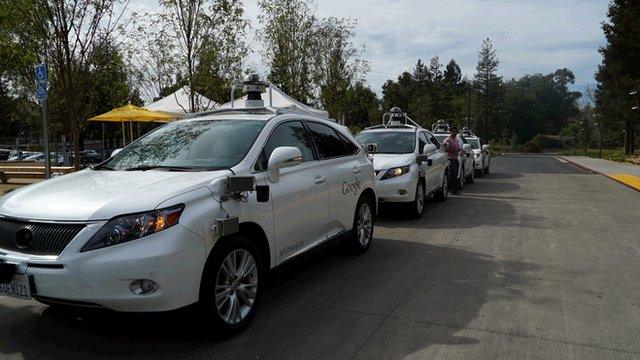
The Lexus cars are able to go on public streets
It won't ever cut corners, or do that tiny burst of speed to nip through the lights as they change. When the lights do go green, it pauses for a second before pulling away, just in case.
It's a Sunday driver, every day of the week.
That, obviously, is a good thing. It's far safer than a human. The brief delay before pulling away on a green light is intentional - a huge proportion of accidents at traffic lights happen in that first moment, as a car whizzes through a red light and clatters into anyone who's pulled away promptly.
But just because it's safe doesn't meant it won't be massively frustrating - particularly if you're desperate to get to work or in any other kind of hurry that required a bit of (legal) urgency on the road.
That's a terrible complaint, isn't it? The impeccable standards are a sign the technology is really quite magnificent.
But like dating someone who is just "too nice", the Google car will start to grate on you a bit.
Boggled by a jogger
As Google works its way through the regulatory hoops, and gains confidence, the next focus will be on just how ready this technology is to hit the streets.
In the test scenario, Google took us on public roads, with common complications - roadworks, road closures and pretty heavy traffic. It was the end of the school day, and so we had parents and children haphazardly crossing the road.
At one point, a skateboarder rolled towards us. The car's idiot detection sensor (to use its unofficial title) instantly knew to give him a wide berth. On the on-board computer, you could see how the technology had broken down the hazard: human + object (the skateboard) + fast movement = stop.
But we did see how the car's nervousness - which is the only way I can describe it - sometimes got it wrong. At one moment in our journey, a jogger ran by. He was on the opposite side of the road, and any human eye would have instinctively known he posed no danger.
But the Google car panicked, hitting the brakes for an emergency stop.
Luckily, there was nobody behind us, or I'm sure they'd have gone into the back of us. Google's engineer told me that if a car had been right behind us it wouldn't have stopped so suddenly.
But suppose the jogger had been a danger? Would the car have ploughed into him rather than causing a crash from behind? It's the classic ethical dilemma that has kept psychologists debating for centuries.
The way Google sees it is that even with those theoretical scenarios - where it's forced to choose between what it thinks is the least harmful - the Google car is still far smarter than a human, and, crucially, will save thousands of lives by existing in the first place.
Riding in a Google car may be slow and boring, but the effect it will have on the world certainly isn't.

Google's view of a driverless future
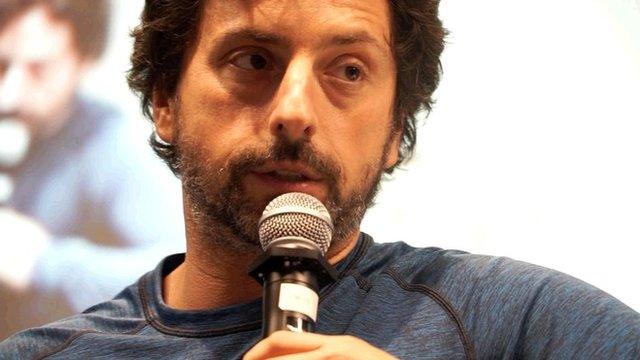
Sergey Brin dropped into the demo day to discuss long-term plans
Sergey Brin, Google's co-founder, thinks there's space for both types of driving experience on our roads. "I love the idea of being out on the open road that's kind of curvy and fun - you're driving, really getting into it," he said.
"But in practice that's probably 1% of my experience.
"Typically I'm in stop-and-go traffic, and some traffic jam, or just going from light to light on a pretty straight road, mostly just trying to make sure nobody does anything weird in front of me and I don't crash into them.
"I think we need to see both of those worlds, and I think there's a future for both of those. I don't think we're going to see no human driver any time soon.
"And I think there's always going to be a pleasure in being able to hit the open road and enjoy that."

Follow Dave Lee on Twitter @DaveLeeBBC
- Published28 July 2015
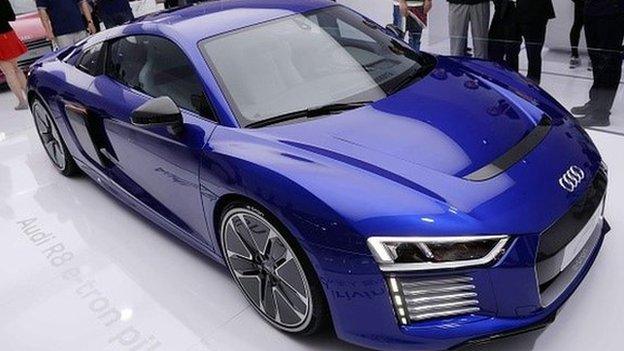
- Published11 February 2015
